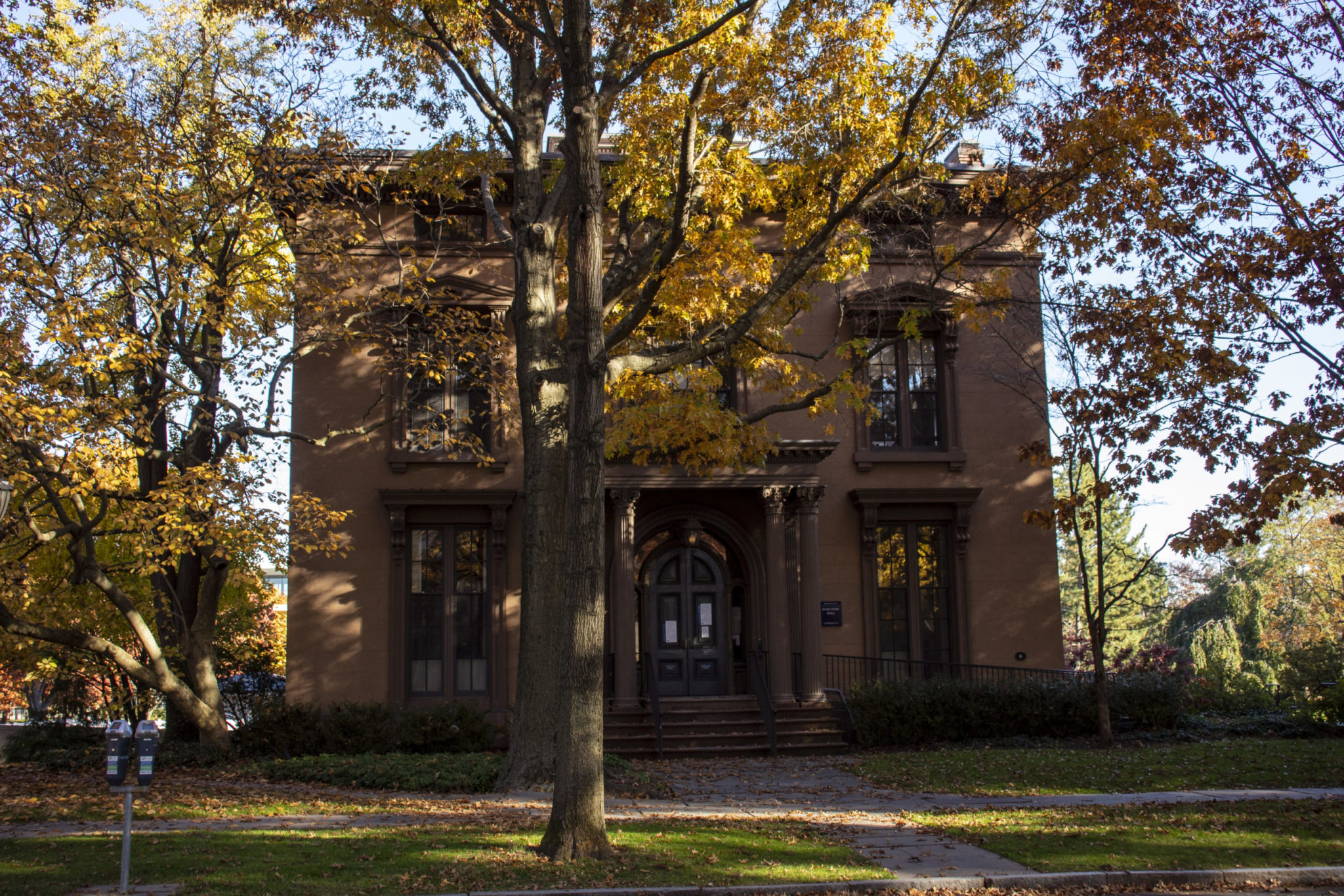From Horchow Hall to Sub-Saharan Africa: The Jackson Institute’s global and growing reach
A recent successful event demonstrates the international reach of the Jackson Institute, which is looking only to expand as it transitions to a graduate school.

Lily Dorstewitz, Staff Photograher
When the Jackson Institute for Global Affairs hosted its inaugural Kurds in the Middle East event on April 14, nobody expected the scale of the event’s viewership. That an estimated three to four million people tuned in to watch the event is reflective of the Jackson Institute’s global reach, according to the Deputy Director for Leadership Programs and Lecturer at the Jackson Institute Ted Wittenstein.
Director of the Jackson Institute Jim Levinsohn, along with Wittenstein, spoke to the News about what made this event so successful, how the Jackson Institute has such a broad, international reach and how they plan to maintain and continue that global expansion. They suggested that a combination of alumni-based outreach and research directed at global issues are key reasons for the international breadth of the institute, and they hope to maintain that reach partly through additional events in various forms.
“It’s just been heartening to see how the Jackson Institute has magnified its impact despite the pandemic,” said Wittenstein. “It shows that there is a wider network that’s part of our [Jackson’s] extended community, and we are eager to keep them engaged.”
The April 14 event, which addressed the historical plight of the Kurdish people and their role in the broader stability of the region, was broadcast via Rudaw Media Network, a Kurdish network that broadcasts in Arabic and English in the Middle East. According to Wittenstein, in addition to broadcasting the event live, Rudaw also livestreamed the webinar over Facebook, and segments of the discussion also re-aired multiple times on Iraqi television. The viewers through Rudaw were overwhelmingly from Iraq and surrounding countries.
“[This event] opened my eyes to the possibilities, and I think as we build out the school, we’ll want to leverage the talent we’ve convened and the Yale name to try to share as widely as we can the things that we are putting together,” Levinsohn said.
Rudaw’s “conservative estimate” is that the event had at least three to four million viewers, Wittenstein said.
“The bottom line is that [the viewership number] is an order of magnitude beyond anything we would normally anticipate, but we were just really heartened to see that because [Iraq and surrounding nations are] a region of the world that is traditionally underrepresented and not always able to access a Yale-Jackson discussion,” Wittenstein said. “We were just delighted to see that type of viewership.”
This partnership between Jackson and Rudaw is precisely the kind of relationship that the Jackson Institute is seeking to develop in order to expand its global reach in the virtual environment of this year, Wittenstein said. He attributed the success of this event to people around the world who are both isolated and eager to connect as they near the end of the pandemic.
“This showed the potential of using this medium, combined with the in-person exchanges, which we are eager to resume as soon as [the] pandemic subsides,” he said. “You do gain this much broader access [through virtual seminars]. In some ways the pandemic has made the Jackson Institute’s events more open and inclusive and so we are all eager to think of how to maintain that going forward.”
The wide audience of this event, as well as that of others that the Jackson Institute has hosted this semester, has demonstrated that there is a community around the world that is keen to engage with the Jackson Institute, Wittenstein said. As a result, reconciling the disparate nature of that community with the in-person events will be one of the most important issues facing the Institute in the near future, according to Wittenstein and Levinsohn.
Another element of the Jackson Institute that demonstrates this global reach is the World Fellows Program, which brings 16 professionals from around the world to spend four months in residence in New Haven teaching, mentoring and researching, according to Wittenstein.
Professor Emma Sky, the director of the World Fellows program, wrote in an email to the News that each year, between two and three thousand people from around the world apply to the program. Anyone can apply, and the World Fellows are selected each year from Asia, Africa, the Middle East, Europe and Latin America.
The Jackson Institute is in the process of transitioning into a graduate school for global affairs, becoming Yale’s 15th school. To Levinsohn, it seemed natural that a school for global affairs would want to bring in students and faculty from around the world. To that end, he said that undergraduate students who major in global affairs are disproportionately international, and people born in the United States made up a minority of Jackson’s 10 ladder faculty.
“On the graduate side, there is a lot of intentionality in trying to get an international group of students and we put a lot of time and effort into making sure that the group of international students is broadly representative of different parts of the globe,” Levinsohn said.
Part of growing a graduate school in global affairs includes ensuring that a broad array of international issues are addressed, Levinsohn said. To that end, the Institute has recently hosted events on topics ranging from the Kurds to China to cybersecurity.
In order to get a global pool of graduate students applying to the Jackson Institute, they leverage the global alumni network in order to “get the word out” about the programs offered at Yale. This is more challenging given that many people who apply to Jackson have already entered the workforce instead of coming straight from another university, according to Levinsohn.
He described sub-Saharan Africa as a particular region where the Jackson Institute has relatively less interaction, partly because there are fewer alumni from those countries who can encourage others to apply.
“It kind of builds on itself,” Levinsohn said. “As we get an alum from Cameroon, from South Africa, from Zimbabwe, from Nigeria they then, when they go back, they help us build that network out, but as a new school that network is still developing.”
Jackson also uses the resources of the Association of Professional Schools of International Affairs, which hosts events around the world, to engage in underrepresented regions.
Levinsohn said that he does not expect Jackson’s transition to a graduate school to affect the size of the graduate program, but that as it becomes more well known, it is likely to become more selective.
And as the Jackson Institute looks to expand its faculty, it will be important to have expertise both on the teaching end and research that speaks to global issues, such as the U.S.-China relationship, Levinsohn said. However, he recognized that this might be one potential area of conflict with University policy. Vice President for Global Strategy Pericles Lewis said in a previous conversation with the News that the University will be adopting a more cautious approach to engagement with China. However, for a new graduate school, it will be important that Jackson is able to teach and research with a focus on China, Levinsohn said.
The World Fellows program was established 17 years ago.










